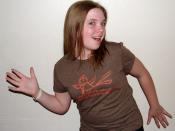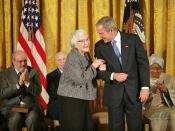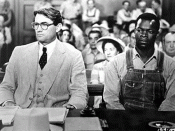The Fundamentals Of Life In To Kill A Mockingbird by Harper Lee, a town called Maycomb in Alabama is nestled away in the hills. Children took to the streets to play, as there was no TV, video games, or computers in the 1930's. Now, in the year of 2001, we have all this available to us, plus so much more! It seems as if everything in this modern age is based on new technology, from the alarm clock that woke me up this morning to the computer that I am typing this essay on right now. Times have changed, technology has changed, and people have changed, but the fundamentals of life have stayed the same. Parenting is one of those fundamentals of living; parents are still responsible for the raising of their children.
As is in many books, you can find similarities between the characters in the book and people you know in real life; in fact, authors plan it that way! Atticus Finch is the father of Scout and Jem in To Kill A Mockingbird, and is one of the main characters.
Atticus truly resembles my father in many ways, one of which is his style of parenting. In my opinion, Atticus has a very passive way of parenting, but still keeps firm control of his children. In my belief, I see this as a very superior style of child raising. Atticus was able to raise his children to be very polite , just like I feel my dad has done to me. However, this still allowed them to have freedom and not be bogged down with restrictions.
In the early 1900's when this book takes place, most people don't have the time or money to be well educated, especially the blacks. However, Atticus "went to Montgomery to read law"ÃÂ(4). He tried hard to get a good education by going to college. My father is also well educated. He went to college and got a degree in Civil Engineering at UC Berkeley and a Masters in Business Administration at Cal Poly San Luis Obispo. Atticus also knew how to handle money well. "Atticus practiced economy more than anything, for several years thereafter, he invested his earnings in his brothers education"ÃÂ(5). My dad always tries to invest his money wisely, and isn't frivolous in his spending. He always says we should be "good stewards of our money"ÃÂ.
My father is always a man to turn to when I need advice, or when I need to know something. He was the one who taught me things like "treat others as you would like to be treated"ÃÂ, and "the difference between right and wrong."ÃÂ Atticus also fulfills this role in To Kill A Mockingbird. "I'd rather you shoot at tin cans in the backyard, but I know you'll go after birds. Shoot all the bluejays you want , if you can hit 'em, but remember it's a sin to kill a mockingbird"(69). This is what Atticus Finch tells his children after they are given air-rifles for Christmas.
Atticus does an excellent job of allowing his children to be open to the world, but keeping them sheltered at the same time. After the Tom Robinson trial is over, Aunt Alexandra tells Atticus that he shouldn't have let the children watch the trial, and Atticus retorts, "they might as well learn to cope with it...It's as much Maycomb County as missionary teas" (189). Atticus symbolically refers to the missionary teas as being just as racist as the trial. Racism does appear in the everyday lives of the narrow minded people of Maycomb County. My father realizes things like this"æ I should know what is going on in the world, or else how would I know how to react or cope with something in the real world when I am out on my own? Both Atticus and my father speak their mind. They say what they think is right. As I have quoted earlier - Atticus says, "I'd rather you shoot at tin cans in the backyard, but I know you'll go after birds. Shoot all the bluejays you want, if you can hit 'em, but remember, it's a sin to kill a mockingbird"(69). Bluejays are viewed as the bullies of the bird world. They are very loud, territorial, and aggressive. The bluejays represent the discriminatory "bullies" of Maycomb County, such as Bob Ewell. Mockingbirds are innocent, and all they do is sing beautiful songs. They would not harm anyone. Killing a mockingbird was the only thing Atticus had ever told his children was a sin. He also told them later in the novel that "As you grow older, you'll see white men cheat black men every day of your life, but let me tell you something and don't you forget it - whenever a white man does that to a black man, no matter who he is, how rich he is, or how fine a family he comes from, that white man is trash"(220). This truly expresses Atticus's feelings towards others. He believes people deserve what they are due. Bob Ewell is a "bully"ÃÂ, so according to Atticus is "white trash"ÃÂ, and deserves what is coming to him at the end of the novel. My father has always been a firm believer in "treat others as you would like to be treated"ÃÂ.
As Harper Lee showed us in To Kill A Mockingbird, there can be many similarities between characters in the book and people you know in real life. I think it is important for you to realize this, as it may bring a new meaning to you about how the book was written. Times and technology have changed, and the fundamentals of life have stayed the same. Parenting is one of those fundamentals of living; parents are still responsible for the raising of their children, and are still the most influential in their lives. This is expressed to the highest degree in Harper Lee's excellent written novel, To Kill A Mockingbird.





